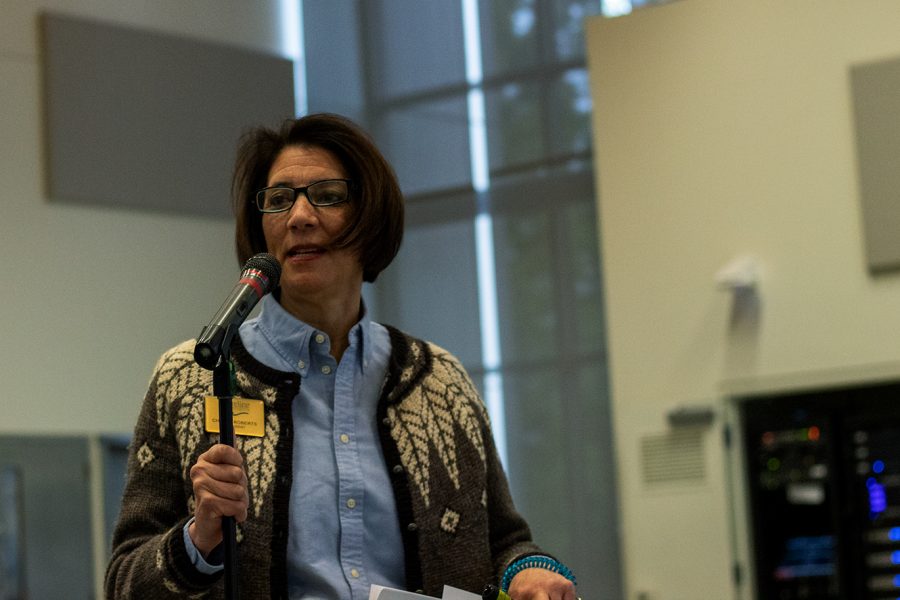SCC Braces for Third Round of Layoffs Amid COVID Shortfall
New Proposal Calls for 11% Cut to Faculty
SCC President Cheryl Roberts addresses staff in a Dec. 5, 2019 budget meeting, prior to the pandemic. Those meetings led up to an initial round of $2.3 million cuts. Photo from file.
October 9, 2020
SCC is preparing to lay off up to 11% of the college’s faculty as the school prepares to trim its operating budget by $8.3 million. The cuts come amid a statewide budget shortfall caused by revenue lost to the COVID-19 pandemic.
The reductions, formally proposed to the SCC Board of Trustees (BOT) in a motion signaling intent on Sept. 25, are projected to take place in December, SCC President Cheryl Roberts told college employees at a Sept. 29 campus budget meeting. In addition to the elimination of faculty positions, administrative and classified staff may see roughly 7% and 8% cuts, respectively.
“Making an $8.3 million reduction hits every part of our college,” Roberts said at the meeting. “These are painful decisions, they’re not easy ones to make. We know it impacts people’s lives.”
Towards the end of spring quarter, the likelihood of a major reduction in staff became apparent to college employees, as Washington state projected a 15% reduction in the state’s operating budget through 2023, which funds 66% of SCC’s annual budget. However, the state halved that shortfall projection at the end of September, according to a report in the Seattle Times.
“We have not gotten any confirmation,” Roberts said of the report. “So while there is optimism in that forecast, we’re still waiting for the (Washington state) Office of Financial Management … in terms of what we can anticipate.”
Roberts also cautioned that factors outside of the state budget shortfall will impact budget decisions. SCC saw a 9% reduction in enrollment fall quarter 2020, which administration attributes to the COVID-19 pandemic. Enrollment at the college declined by 8% in the year leading up to the pandemic.
SCC Federation of Teachers (SCCFT) union leadership has seized upon those other factors in a campaign to shift cuts more towards the college administration and outside of their ranks.
SCCFT President Eric Hamako protested cuts to faculty positions at the Sept. 25 BOT meeting, taking issue with the college’s “financial practices and basic priorities.” He argued that faculty “generate FTE revenue for the College,” yet are the first targeted for reductions.
With such deep cuts, administrators say they cannot concentrate them all in one area, and recognize that the college will not be able to return to business as usual.
“In some cases, we will have to do less with less,” Phillip King, the college’s vice president for student learning, told college employees at a June 15 budget meeting.
Other local colleges have taken similar measures. Everett Community College (EvCC) laid off 85 part-time hourly staff in June, according to the college’s student paper, The Clipper.
The anticipated cuts will be the third round of major budget cuts at SCC in the past two years. At the beginning of last spring, before the financial effects of COVID-19 became apparent, the college eliminated several positions and made other reductions for a total of $2.3 million in cuts. The school made an additional $1.6 million in cuts over the summer as the state’s shortfall became apparent, with about $900 thousand coming from position eliminations.
An Ebbtide review of the college’s pre-COVID financial struggles, published last June, found that the SCC has overspent revenue for the past six years. During those six years, the college spent from its cash balance (leftover funds from revenue positive years) to avoid layoffs. The college also keeps a roughly $10 million board reserve for capital projects, which cannot be tapped into for sustaining faculty levels.
Dawn Beck, the college’s vice president for business and administrative services, calculated that SCC will have a $4 million cash balance remaining after all expenses this year, even with the proposed reductions.
Though the college would not need to expend that money to maintain operation, it is important to have reserves for emergencies. The current reserve is nominal compared to the cost to run the school.
“How long could that money last us if we needed it?” Beck asked. “Without reserves, we have about one month’s worth of cash.”







